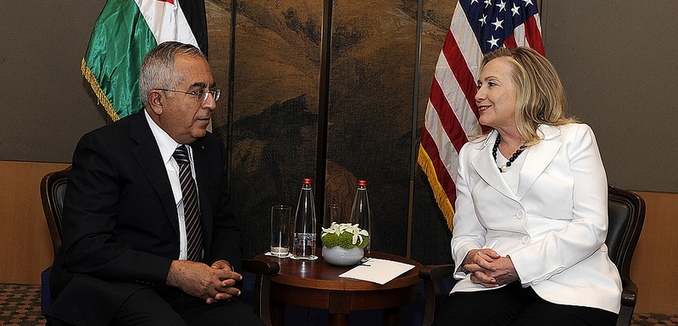Arabic media sources are reporting that President Mahmoud Abbas has accepted the resignation of Palestinian Prime Minister Salaam Fayyad, after the two met briefly late in the day Saturday.
The resignation comes in the aftermath of a public spat between the two officials over the departure of Finance Minister Dr. Nabil Kassis, considered to be an Abbas confidante. It is unclear who will replace the Western-backed Fayyad, though in recent days Palestinian media has suggested that the front-runners include Dr. Rami Hamdallah, President of An-Najah National University, and Dr. Mohammad Mustafa, chairman of the Palestinian National Investment Fund. It is not known how long Fayyad will continue to serve in an interim capacity, with rumors varying from a few days until the next Palestinian election.
Fayyad’s resignation risks cooling increasingly chilly diplomatic relations between Washington and Ramallah and deepening visible interpersonal strain between U.S. President Barack Obama and Abbas.
Fayyad is considered by the West to be a key figure in checking Palestinian corruption and promoting civil institution building, both vital prerequisites to creating a functioning Palestinian state. Abbas’s decision to accept Fayyad’s resignation came despite significant public U.S. pressure. Aides to Abbas had told Reuters that Abass was eager for Fayyad to resign, even was Western diplomats urged him to put off the decision:
Aides to Abbas, speaking on condition of anonymity, were scathing in their assessment of the Texas-educated Fayyad, hinting that the president would be pleased to see him go. However, a Western diplomat expressed dismay at the political in-fighting at a time when the United States is making a concerted effort to revive Israeli-Palestinian negotiations and boost the flailing economy.
“Pressure is being put on Abbas to sit on this resignation offer for at least two months to see what comes of the U.S. initiative,” said a senior European diplomat, who declined to be named because of the sensitivity of the issue.
Recent months have seen Abbas brush off U.S. and Western calls to suspend moves which – while politically advantageous for him domestically – negatively impact diplomatic prospects with Israel and undermine U.S. interests.
Last fall Abbas led the Palestinian effort to seek and secure a United Nations declaration of non-member statehood, an act that violated decades-old Palestinian commitments to refrain from “steps that will change the status of the West Bank… pending the outcome of the permanent status negotiations” and which Palestinian officials said marked the end of the peace process. Obama opposed the move and U.S. officials emphasized that it harmed U.S. diplomacy.
The symbolic declaration heightened Palestinian expectations and was subsequently linked to a wave of violence when Abbas failed to meet those expectations. Fayyad is known to have opposed the campaign.
Avi Issacharoff contributed to this report
[Photo: U.S. Embassy Tel Aviv / Flickr]




